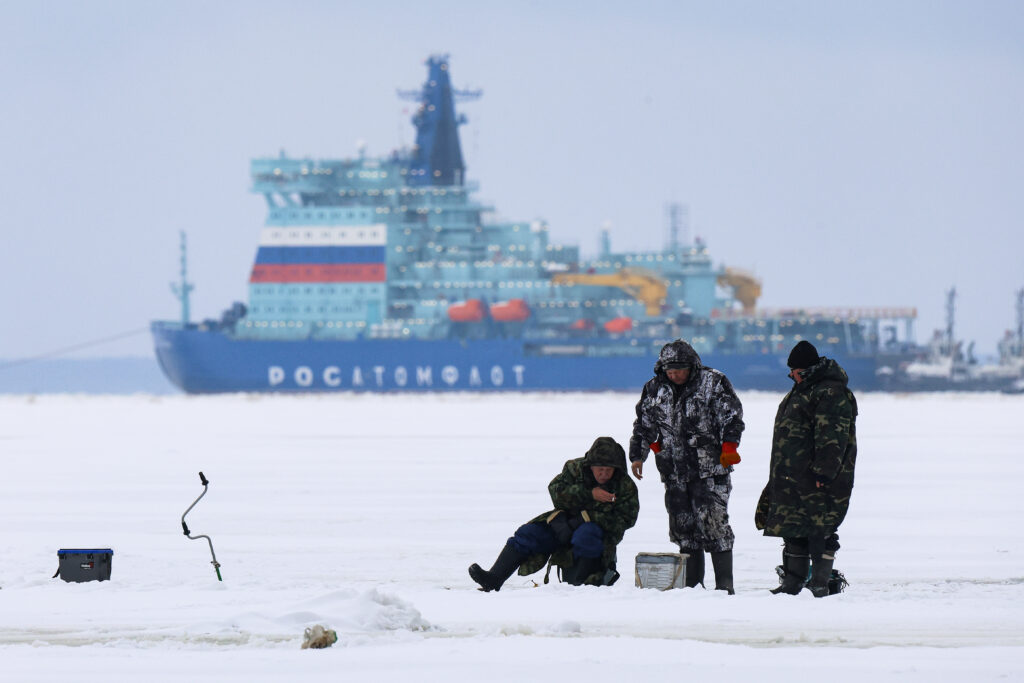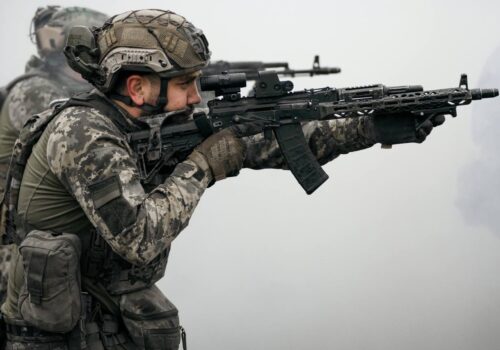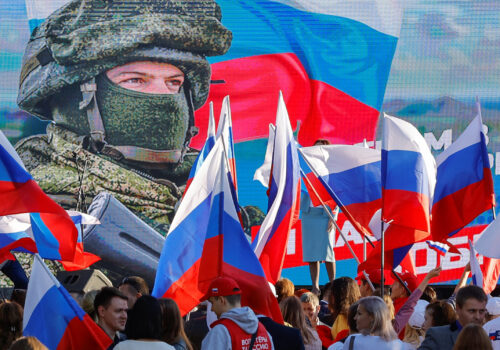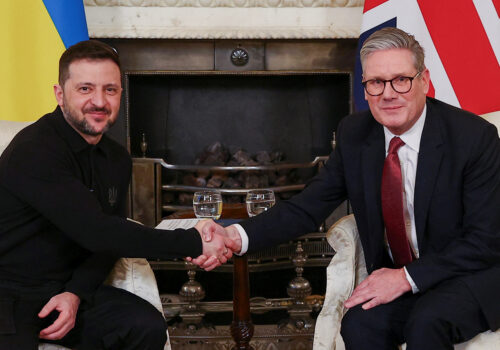US President Donald Trump’s desire to acquire Greenland from Denmark has recently helped to highlight the growing geopolitical importance of the Arctic region in international affairs. As global temperatures rise and polar icecaps melt, increased access to Arctic resources and trade routes look set to make the region and major focus of international competition in the coming decades.
Since the Trump White House and the Kremlin began negotiations in February 2025 to end the Russian invasion of Ukraine, potential cooperation between the United States and Russia in the Arctic has been high on the agenda. However, the US will face stiff competition from China in this arena, with Arctic initiatives occupying an important place at the heart of the strengthening strategic relationship between Beijing and Moscow.
Stay updated
As the world watches the Russian invasion of Ukraine unfold, UkraineAlert delivers the best Atlantic Council expert insight and analysis on Ukraine twice a week directly to your inbox.
Maritime strategy has long played a significant role in Russian President Vladimir Putin’s thinking as he works to expand Moscow’s influence on the international stage. In August 2024, Putin ordered the establishment of a Russian maritime collegium headed by his close personal ally and advisor Nikolai Patrushev, who formerly led Russia’s FSB security service and the country’s National Security Council.
The recent creation of a maritime collegium comes at a time when Russia is accused of engaging in a wide range of hostile naval acts including the sabotage of undersea cables in the Baltic Sea along with surveillance activities off the coast of Britain and other NATO member states. Unsurprisingly, one of the stated goals of the new collegium is to help secure Russia’s national interests in the Arctic.
Russia’s Arctic ambitions are similarly evident in the country’s current maritime doctrine. Russian control over the Northern Sea Route, which runs through Arctic waters along Russia’s northern coast and serves as the shortest shipping route between Europe and the Pacific, is vital for the Kremlin’s plans. With this in mind, Putin is currently prioritizing an enlarged and modernized military presence in the Arctic region including enhanced naval capabilities.
Moscow sees the Northern Sea Route as part of Russia’s national transport infrastructure and has sought to control access for shipping from other nations. This is particularly controversial as the Northern Sea Route covers a vast area that is expected to become increasingly navigable in the coming years due to changing environmental conditions. Some of the areas currently claimed by the Kremlin are situated well beyond the territorial waters of the Russian Federation.
Critics have argued that Russia’s efforts to restrict access to the Northern Sea Route directly violate the 1982 United Nations Convention on the Law of the Sea (UNCLOS). However, while Russia is a signatory of the convention and ratified its commitments to UNCLOS in 1997, Kremlin officials say the terms are not applicable to Russia’s maritime claims in the Arctic region.
Eurasia Center events

With Russia militarizing along the Northern Sea Route and laying claim to large parts of the Arctic maritime zone, the scope for potential future conflict is huge. Geopolitical tensions are likely to be further heightened by the deepening regional involvement of China in partnership with Russia. The two nations have identified the Arctic as a key area of cooperation, both as a trade route linking China to Europe and as a source of the natural resources that Beijing needs to fuel its economy.
In the years ahead, the ports of the Northern Sea Route could become increasingly important for the projection of Chinese and Russian naval power on the international stage, both in the Arctic region and beyond. This could allow both countries to enforce their claims to Arctic resources and overwhelm other regional nations with less powerful navies such as Canada, Denmark, and Norway. This is leading to security concerns over a number of isolated and vulnerable islands throughout the region.
Allowing Russia to gain the ascendancy in the Arctic would lead to unpredictable geopolitical consequences. Control over the oil and gas resources of the Arctic region could dramatically increase Russian state revenues. Past experience indicates that this windfall would likely be used by the Kremlin to finance military spending, potentially setting the stage for fresh acts of aggression. Limiting Russian access to the Arctic should therefore be viewed as matter of international security.
As the struggle for dominance in the Arctic heats up, it is already clear that NATO member states need to dramatically strengthen their presence and capabilities in the region. It would also make sense to call upon international bodies such as the International Court of Justice to request clarification regarding the regime that Russia has arbitrarily established in the waters of the Northern Sea Route.
Ultimately, the goal should be to conclude an international convention based on UNCLOS and the UN Charter that can prevent today’s mounting tensions from leading to armed conflict in the Arctic. Before that can happen, countries with territories that could potentially be at risk from an expansionist Russia should look to seek enhanced security agreements with the United States and other NATO members that comply with the requirements of international law.
Bohdan Ustymenko is director of Ukraine’sNational Security Institute.
Further reading
The views expressed in UkraineAlert are solely those of the authors and do not necessarily reflect the views of the Atlantic Council, its staff, or its supporters.

The Eurasia Center’s mission is to enhance transatlantic cooperation in promoting stability, democratic values, and prosperity in Eurasia, from Eastern Europe and Turkey in the West to the Caucasus, Russia, and Central Asia in the East.
Follow us on social media
and support our work
Image: Artem Priakhin / SOPA Images via Reuters Connect





